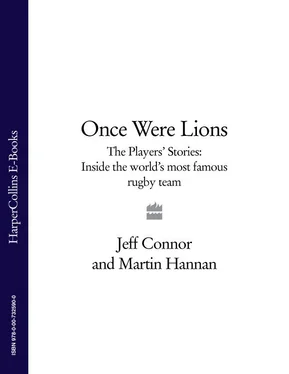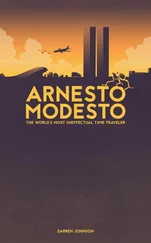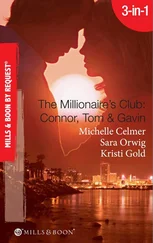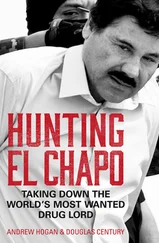ONCE WERE LIONS
Jeff Connor & Martin Hannan

Foreword by Finlay Calder OBE
Preface The men who once were Lions
Chapter 1-First twenty years of the Lions1888–1908
Chapter 2-Then they were Lions1910–1938
Chapter 3-Karl Mullen’s Happy BandAustralia and New Zealand 1950
Chapter 4-Robin Thompson’s Quality Street GangSouth Africa 1955
Chapter 5-Ronnie Dawson’s Proud SquadAustralia, New Zealand and Canada 1959
Chapter 6-Arthur Smith’s Big Boys didn’t crySouth Africa 1962
Chapter 7-Mike Campbell-Lamerton and how the Lions were mauledAustralia, New Zealand and Canada 1966
Chapter 8-Tom Kiernan’s Frolicsome BrigadeSouth Africa 1968
Chapter 9-John Dawes and The Great RevivalNew Zealand and Australia 1971
Chapter 10-Willie John Mcbride’s LegendsSouth Africa 1974
Chapter 11-Phil Bennett’s Bad News BoysNew Zealand and Fiji 1977
Chapter 12-Bill Beaumont and The Bad Luck TourSouth Africa 1980
Chapter 13-Ciaran Fitzgerald’s Men Cut DownNew Zealand 1983
Chapter 14-Finlay Calder: No CompromiseAustralia 1989
Chapter 15-Gavin Hastings and the tale of two toursNew Zealand 1993
Chapter 16-Martin Johnson’s MarvelsSouth Africa 1997
Chapter 17-Scribblers for Martin Johnson’s LionsAustralia 2001
Chapter 18-Speared by the all Blacks: Brian O’DriscollNew Zealand 2005
Chapter 19-Lions for ever
Index
Roll of Honour and Archive of Results
Copyright
About the Publisher
FOREWORD By Finlay Calder OBE Captain, the British and Irish Lions in Australia, 1989
On 15 July 2006, I sat in the Caledonian Club in London, surrounded by friends from the British and Irish Lions who had toured Australia with me some seventeen years previously.
Rory Underwood apart, the rest of us had long given up on our youthful looks, and much water had passed beneath the bridge since those wonderful days back then. It was a night of great warmth, more than a few drams: an evening of mutual respect, trust and friendship. Before we said Grace, I suggested that in the intervening years, probably not one of us has escaped the passing of time. In truth, most of us at some stage must have trod a pretty uncomfortable path, whether that had been in terms of health, wealth or indeed happiness.
But why should a British Lion be different from anyone else? The truth is of course, he is not, and just like everyone else, they are burdened with the trials that come along in this life of ours.
To quote Max Ehrmann:
Take kindly the counsel of the years, gracefully surrendering the things of youth.
Nurture strength of spirit to shield you in sudden misfortune. But do not distress yourself with dark imaginings. Many fears are born out of fatigue and loneliness. Beyond a wholesome discipline, be gentle with yourself.
A night like that in London reminded us all just how privileged we had been in our lives to have come in contact with this wonderful pastime.
This book, Once were Lions by Jeff Connor and Martin Hannan, perhaps underlines that although some may have suffered at times, all Lions, I’m sure, will have felt privileged to at least have been given the chance to have worn the famous red jersey in their rugby lives.
Finlay Calder, January 2009
PREFACE THE MEN WHO ONCE WERE LIONS
There is no such thing as a ‘former’ British and Irish Lion. Like the kings and queens of Britain, once you are a Lion you always stay a Lion, except that you can never abdicate Lionship. That is entirely fitting, for to be a Lion means to be a king, if only of the wonderful, glorious, many-hued jungle that is rugby union.
In this book you will find no references to ‘former’ or ‘ex’-Lions. To us, the men who once were Lions on the field have stayed Lions in name and status ever since. Since the day they pulled on the Lions jersey, through the many vicissitudes of life—in this book you will read of some who have suffered—they have carried the title of Lion. It is an honoured name, revered indeed. It marks out every one of those who once were Lions as a breed apart, special men, and no one can ever take the name away from them.
Let us say at the outset that this is not a definitive history of the British and Irish Lions, nor is it meant to be. Works such as The History of the British Lions by Clem Thomas and his son Greg, and British Lions by John Griffiths, are the standard Lions histories and we are not trying to compete with them. Indeed we are indebted to Clem, Greg, John and all the many, many writers, journalists, biographers and memorialists who have chronicled the Lions in the past 120 years.
This book is a history of a kind, though. It is the story of extraordinary men in circumstances which for many of them happened just once. It is tale of happy and sad experiences, all of them life-changing in a way, because once a man becomes a Lion, he is altered and exalted, and joins a roll of honour bedecked by comparatively few in rugby. There is no going back to being ordinary once you are a Lion.
For that reason we have ignored an old convention that a person only really becomes a Lion when he plays in an international Test Match. For us, to be named a Lion it is enough that a player pulled on the jersey no matter the opposition—W.S. Gainsford was injured in the very first training session of the 1924 tour to South Africa, and never played for the Lions, but he was deemed worthy of selection for the tour so his name is on the Roll of Honour at the end of this book. Gerald Davies, who will manage the Lions on their forthcoming tour to South Africa, put it succinctly: ‘The Lions are the best of the best, and those who are selected for the Tests are the best of the best of the best.’
This account is in great part the players’ own history of the Lions. It is very much their first-hand story, told by the Lions themselves in a series of interviews given over the past few years to Jeff Connor and in 2008/09 to Martin Hannan. We conceived of this book as a written record of history provided by the Lions themselves, and that is why we mention the views of administrators, coaches and commentators, such as rugby correspondents, only when they are relevant to what happened to the players.
It stands to reason that we have been unable to interview any Lion from before the Second World War. Where necessary—for instance in the first and second chapters—we have augmented their recorded views with contemporaneous reports. We have also taken on board the views and thoughts of some relatives of the Lions, on the entirely justifiable grounds that the men themselves are sadly no longer with us.
For some of the Lions, assisting the authors of this book has been the first chance they have taken to talk about their experiences. Whether or not their words are controversial, let no one doubt the sincerity of their views.
We are greatly indebted to Finlay Calder OBE for his support for this project from the outset. He has been a great friend over the years to Jeff Connor in particular, and you simply could not meet a more honest, modest and loyal a man. Almost twenty years on from his magnificent captaincy of the Lions in Australia, he remains one of the few men to bring back a winning series from the Antipodes.
Читать дальше













